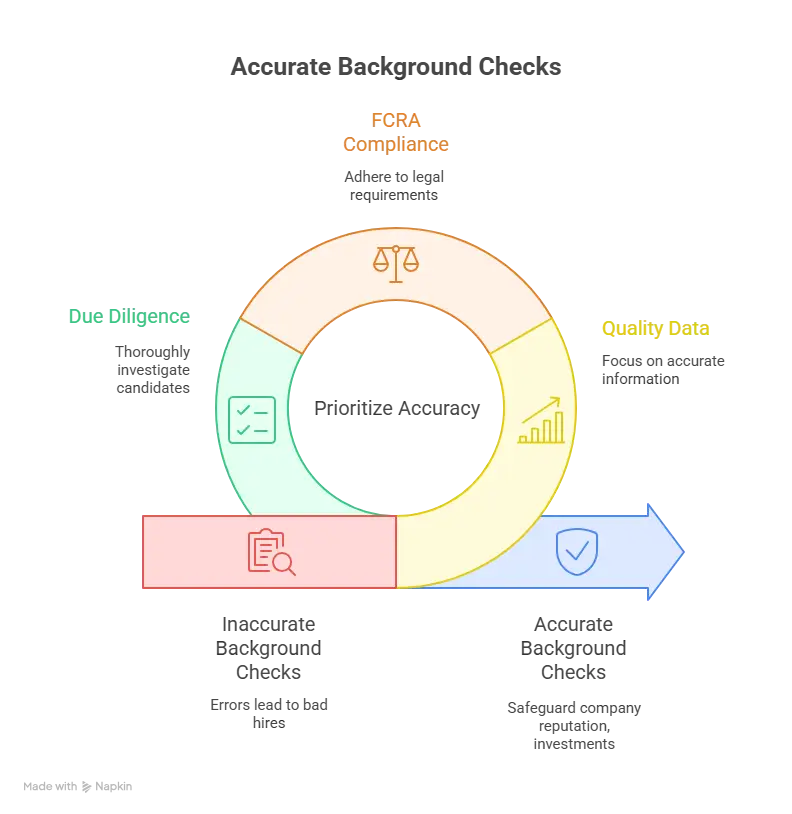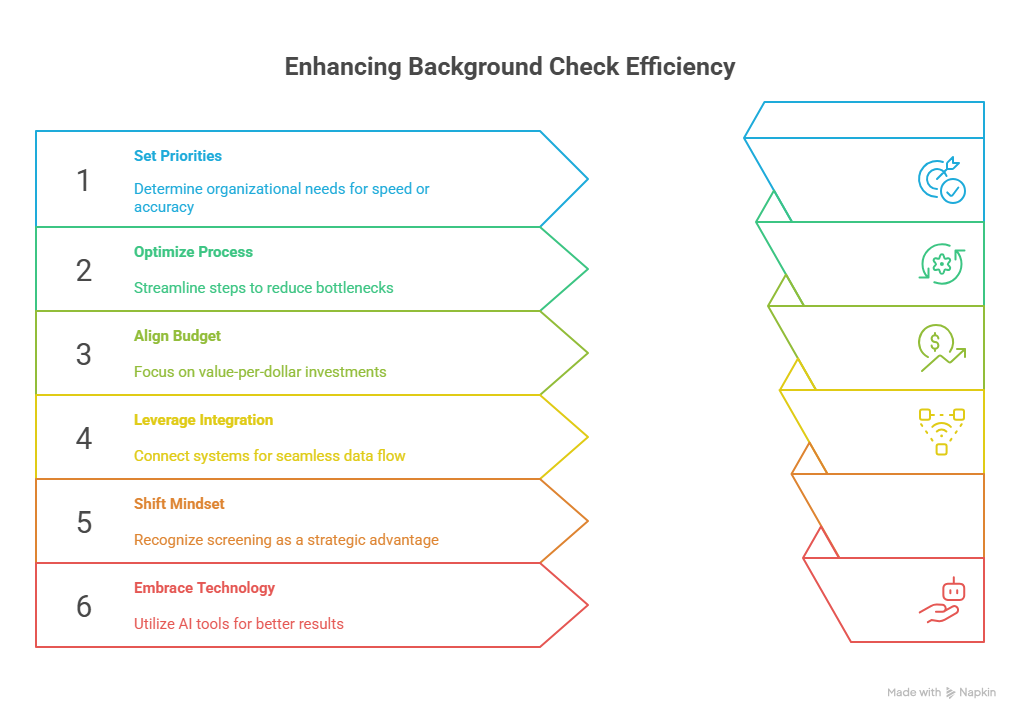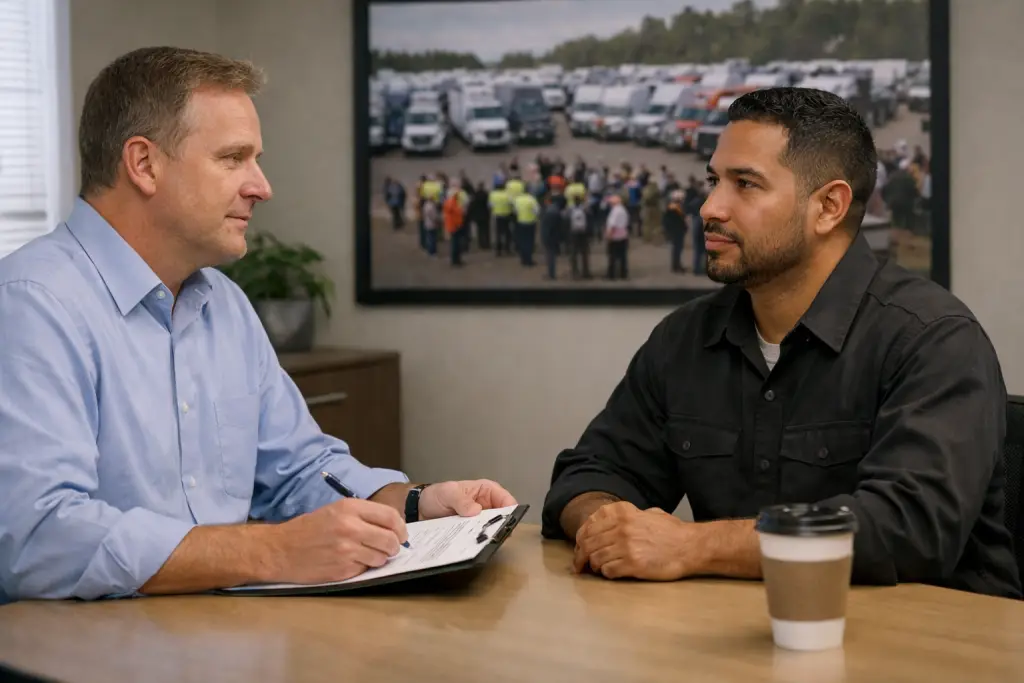Background screening is a critical component of the hiring process, demanding careful navigation between two seemingly conflicting priorities: accuracy and speed. In recent years, the Society for Human Resource Management (SHRM) highlighted a shift in employer priorities: While speed temporarily overtook accuracy, the latter has regained its place as the top concern for most businesses. This article delves into the reasons behind these shifts, examines the implications of prioritizing one over the other, and explores strategies to achieve both.
Key Takeaways
- Background checks are critical for making informed hiring decisions and protecting your company's reputation.
- `Recent trends show a shift towards prioritizing accuracy over speed in background checks, as errors can lead to costly consequences.
- Modern technologies like AI can enhance both speed and accuracy in screenings, making them more efficient and reliable.
- HR professionals should focus on refining processes and integrating technology to balance accuracy and speed effectively.
- Consider how your organization can implement these strategies to improve hiring practices while minimizing risks.
In the fast-paced world of hiring, background checks play an essential role in ensuring companies make informed decisions. Each potential hire's background needs to be verified for accuracy, which can affect a company's reputation, legal standing, and financial health. Historically, there has been an ongoing struggle to balance this need for accuracy with the pressure to fill positions quickly.
Recently, the Society for Human Resource Management (SHRM) has noted a shift back towards valuing accuracy above speed, evident in their 2024 findings. This change indicates an employer recognition that mistakes in the hiring process can be costly. Errors found during background checks can lead to lawsuits, regulatory fines, or even hiring liabilities. Employers are transitioning focus to ensure due diligence is prioritized.
This article will explore pathways to achieving both accuracy and speed in background checks. With modern technology and best practices, employers can enhance their screening processes without sacrificing one priority for the other. Strategies and tools such as AI, reliable database checks, and compliance with legal standards like FCRA can empower HR professionals to make better, faster decisions.
EXPERT INSIGHT: Balancing accuracy and speed in background screening isn't just a strategy—it’s a responsibility. The future of business and of people relies on making the correct decisions, and speed and accuracy go hand-in-hand. You can be too slow today and potentially lose the best talent there is. You can’t remediate this by doing one or the other, but by enhancing systems, collaborating better with partners, and doing it all better and quicker. This equates to carefully and deliberately recruiting, because people are worthy of that. - Charm Paz, CHRP
The Importance of Background Check Accuracy
Inaccurate checks can hurt your business. Errors might lead to lawsuits, lost candidates, or bad hires. A single mistake could mean hiring someone unfit for the job, leading to internal issues or, worse, safety risks. Imagine discovering a new hire's criminal history after they join. It’s not a pleasant surprise—a survey from SHRM found that over half of employers conduct criminal background checks primarily to reduce legal liability for negligent hiring.
Good data allows you to make the right call on who fits your organization best. SHRM’s 2024 findings show a renewed employer focus on accuracy in background screening, driven by the high stakes of errors and the increased legal risks they present. Employers are once again prioritizing quality data over speedy, but potentially flawed, background checks.
Don’t ignore compliance. The Fair Credit Reporting Act (FCRA) sets the rules, ensuring accuracy in background checks. Breaching these can lead to fines or legal trouble. The SHRM Background Investigations Toolkit outlines FCRA compliance as critical to protecting your business’s integrity and avoiding potential penalties.
The stakes are high. A recent industry survey found that 67% of employers faced challenges due to background check errors. Don't let speed compromise your due diligence. Prioritize accuracy to safeguard your company's reputation and investments.

The Rising Demand for Speed
The drive for quicker background checks has roots in market pressures. As the job market grew more competitive, especially in industries like tech and healthcare, rapid hiring became crucial. Employers raced to fill positions to avoid losing talent to competitors. Quick onboarding can mean the difference between snagging a star candidate or watching them go elsewhere.
This need for speed, however, wasn't without pitfalls. A focus on haste often led to missteps. When checks are rushed, errors sneak in, from mismatched records to overlooked details. Such mistakes can cost more than just time—they can lead to hiring the wrong person or missing critical red flags, with serious legal and financial implications down the line.
Reflect on the hiring pressures within your organization. Are you pushing for speed without considering accuracy? Balancing these elements is essential to avoiding costly future headaches.
Achieving Accuracy with Efficiency
Modern technology lets you enhance both speed and accuracy in background screenings, which is supported by SHRM’s 2024 guide on balancing efficiency and effectiveness in the screening process. Artificial intelligence plays a pivotal role here. By automatically sorting through vast amounts of data, AI speeds up the process while reducing errors. Leveraging reliable databases is crucial. Consistent data verification ensures what you have is accurate and up to date.
Adopting best practices amplifies these benefits. Start by using multiple databases. This cross-referencing strengthens results. Regular audits of your processes help catch and correct errors early. It's about creating a routine where accuracy naturally follows efficiency.
Consider employing AI to handle repetitive tasks in your screenings. This frees up human resources for tasks requiring judgment, like interpreting ambiguous information. Not only does this improve speed, but it also maintains a level of accuracy that manual processing cannot achieve alone.
These steps offer a dual benefit: they cut down on time without compromising the trustworthiness of your results. By adopting technology and refining processes, you strike that balance between speed and accuracy.
Balancing Both: Strategies for HR Professionals
Balancing accuracy with speed in background checks is critical for HR teams. It's not just a matter of performance—it's a matter of protecting your organization from bad hires, compliance risks, and process inefficiencies.
1. Set Clear Priorities
Start by identifying what matters most to your organization:
- Precision-first environments: Legal, healthcare, finance
- Speed-first environments: Retail, hospitality, seasonal hiring
Ask yourself: Is your biggest risk a bad hire—or a lost hire?
2. Optimize Your Process
Step-by-Step Improvements:
- Map your current screening process Identify bottlenecks or repeated tasks.
- Streamline communication Centralize document exchange with candidates.
- Cut unnecessary steps Simplify verification layers where legal standards allow.
3. Align Budget with Value
When facing budget constraints:
| Screening Component | Cost Level | Business Value | Keep, Replace, or Remove? |
|---|---|---|---|
| Criminal record check | Medium | High for safety-sensitive roles | Keep |
| Reference checks | High | Medium value | Replace with automated tools |
| Education verification | Medium | Low in certain roles | Optional |
- Focus on value-per-dollar, not just total cost.
- Invest in tech that pays off in both speed and accuracy.
4. Leverage Integration
Use software that connects with your existing HR systems:
- Benefits:
- Fewer manual steps
- Faster data flow
- Lower error rates
- Key Integrations:
- ATS (Applicant Tracking System)
- HRIS (Human Resource Information System)
- Identity verification tools
5. Shift Your Team’s Mindset
- Treat background screening as a strategic advantage, not a task.
- Train staff to understand the ROI of accurate, fast results.
- Reinforce the link between quality hires and quality checks.
6. Embrace Technology
Modern screening tools powered by AI offer:
- Lower error margins
- Faster decision-making
- Smarter risk detection
It's time to rethink the approach to background checks. HR teams need to leverage technology and adopt effective methodologies to ensure they achieve accuracy and speed. GCheck's expertise can serve as a valuable resource to guide efforts in enhancing these critical functions. As you navigate the evolving landscape of employment screening, remember that balancing these factors is not only achievable but necessary for modern-day recruitment success.

Frequently Asked Questions
What is the most accurate background check?
The most accurate background check typically involves a combination of professional services, which may include criminal history, credit reports, employment verification, and reference checks. Hiring a reputable background check company can ensure thoroughness and accuracy. These companies have trained professionals who can access official records and verify information directly with sources, reducing the risk of errors common in automated systems.
What is the hardest background check to pass?
Government background checks, particularly those for security clearances, are considered the hardest to pass. They are comprehensive and include checks on criminal records, financial history, employment records, education verification, and personal and professional references. They may also involve interviews with neighbors, previous employers, and colleagues. The higher the level of clearance required, the more detailed and scrutinized the check will be.
How accurate are online criminal record searches?
Online criminal record searches can vary in accuracy. Many online services rely on public databases that may not be updated regularly. Discrepancies, outdated information, and incomplete records can occur. For precise information, it's best to use services that access records directly from official government databases or hire professionals who can verify information.
What information is typically included in a background check?
A typical background check includes information such as criminal history, employment verification, education history, credit reports, driving records, and identity verification. The specific information included can vary based on the purpose of the check. For instance, tenant screenings might focus more on financial and rental history, while employment checks emphasize work experience and qualifications.
Can you conduct a background check yourself?
Yes, you can conduct a basic background check yourself by researching public records, social media profiles, and other online resources. However, for more comprehensive checks, it's advisable to use a professional service. They have access to databases and know the legal limitations of the information they can gather.
How long does it take to complete a background check?
The time it takes to complete a background check can vary depending on the depth of the check and the resources used. Basic checks can be completed in a few minutes to a day. More detailed checks, such as those covering employment and education verification or involving international aspects, may take several days to weeks.
Are background checks legal for all purposes?
Background checks are legal, but there are regulations governing their use. For instance, the Fair Credit Reporting Act (FCRA) sets guidelines for employment-related background checks in the U.S. You must have permission from the individual for these checks, and the information gathered cannot be used to discriminate. Always ensure compliance with relevant laws when conducting a background check.
Do background checks affect credit scores?
Background checks for employment or tenancy typically do not affect credit scores. These checks are considered "soft inquiries" and do not impact your credit. However, if a lender performs a credit check as part of a loan application, it can affect your score, as these are "hard inquiries".
Definitions
- Background Check - A background check is the process of verifying a candidate’s history before hiring. It usually involves reviewing criminal records, employment history, education, and identity. Employers rely on background checks to confirm that candidates are honest and fit for the role. It protects the company from potential risks like fraud or legal action. For example, failing to verify a candidate’s degree could lead to credibility issues later on.
- Fair Credit Reporting Act (FCRA) - The FCRA is a federal law that sets rules for how companies use consumer information, including during background checks. It requires that employers get written consent from a candidate before running a check. If a report causes a hiring decision to change, the employer must notify the candidate and give them a chance to respond. Ignoring these steps can result in fines or lawsuits.
- Time-to-Hire - Time-to-hire is the number of days between posting a job and when a candidate accepts an offer. It’s a key measure in recruitment and reflects how fast your hiring process works. A shorter time-to-hire can help you compete for talent, especially in fast-moving industries. However, rushing the process can increase error rates, especially in background checks.
- Due Diligence - Due diligence in hiring means thoroughly checking an applicant’s background to confirm they meet your standards. This can include verifying work history, licenses, or criminal records. Skipping steps here may lead to serious consequences, like unsafe hires or regulatory penalties. Solid due diligence shows that your team is careful and legally compliant.
- Process Optimization - Process optimization means identifying and fixing inefficiencies in your hiring workflow. It may involve using better tools, simplifying steps, or removing delays. For example, integrating your background check software with your HR platform can reduce manual work and improve accuracy. Small changes here can save time and cut errors that affect hiring decisions.
Conclusion
The attainment of the correct balance between speed and accuracy in Background Screening has moved from being just an optional necessity to being an absolute requirement. In the constantly changing recruitment arena, it becomes absolutely necessary that our procedures remain up-to-date, timely, and in accordance with all applicable standards. The adoption of proper technology and streamlining of internal operations allow Human Resources functions to deliver speed and accuracy. Promoting an extensive recruitment process over hurrying through one allows organizations to reduce risk and enhance workforce quality. The goal is not only to fill positions quickly, but to fill them accurately.

GCheck Editorial Team
Meet the GCheck Editorial Team, your trusted source for insightful and up-to-date information in the world of employment background checks. Committed to delivering the latest trends, best practices, and industry insights, our team is dedicated to keeping you informed.
With a passion for ensuring accuracy, compliance, and efficiency in background screening, we are your go-to experts in the field. Stay tuned for our comprehensive articles, guides, and analysis, designed to empower businesses and individuals with the knowledge they need to make informed decisions.
At GCheck, we're here to guide you through the complexities of background checks, every step of the way.






